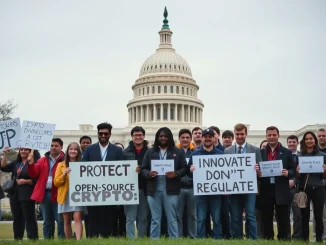
The push for clear US stablecoin regulation is facing a critical hurdle. Ahead of a significant vote, Democratic members of the Senate Banking Committee have released a staff analysis that raises serious questions about the latest draft of the GENIUS Act, a bill intended to provide a framework for regulating stablecoins.
What is the GENIUS Act and Why Does it Matter?
The GENIUS Act is being considered as a foundational piece of crypto legislation in the United United States. Its primary goal is to bring stablecoin issuers under a regulatory umbrella by proposing:
- Mandatory licensing requirements for issuers.
- Requirements for full reserves backing stablecoins.
- Mandatory disclosures about reserve assets and operations.
Proponents argue that clear rules are essential for fostering innovation while protecting consumers and maintaining financial stability. However, the recent analysis from the Senate Banking Committee staff highlights significant concerns that the current draft may fall short of these goals.
Alarming Concerns Raised by the Senate Banking Committee
According to reports, including one from Crypto in America host Eleanor Terrett, the analysis from the Senate Banking Committee staff points to several potential flaws in the GENIUS Act draft. These concerns are significant because they suggest the bill, in its current form, might create new problems rather than solve existing ones. Key issues raised include:
Could the GENIUS Act Benefit Specific Individuals and Entities?
One of the most notable warnings in the report concerns potential loopholes that could be exploited. The analysis reportedly suggests the bill might inadvertently enable crypto-related activities that could benefit figures like former U.S. President Donald Trump. It also raises the possibility that the draft legislation could clear the path for Elon Musk’s platform, X, to launch a financial service dubbed “X Money,” potentially without sufficient oversight. These specific examples highlight the report’s fear that the bill’s design might favor certain powerful players.
Are There Expanded Tether Loopholes?
Another critical point of concern revolves around Tether loopholes. Tether (USDT) is the largest stablecoin by market capitalization and has faced scrutiny regarding its reserves and transparency in the past. The analysis warns that the GENIUS Act draft could potentially expand existing loopholes related to Tether, which might inadvertently benefit illicit actors by providing avenues for money laundering or other illegal financial activities. Addressing Tether loopholes is seen as vital for the integrity of the stablecoin market.
Is Consumer Protection Lacking in the Draft?
Beyond the specific entity concerns, the report also highlights broader issues regarding consumer protections and financial safeguards. Critics argue that the current draft does not include robust enough provisions to shield everyday users from potential risks associated with stablecoins or the platforms that issue them. Adequate consumer protection is a cornerstone of sound US stablecoin regulation.
Why These Loopholes Matter for Crypto Legislation
The concerns raised by the Senate Banking Committee staff underscore the complexity of crafting effective crypto legislation. While the intent of the GENIUS Act is to establish clear rules for US stablecoin regulation, the analysis suggests the devil is in the details. Loopholes related to prominent figures, major platforms like X, and the largest stablecoin issuer (Tether) could undermine the bill’s purpose and potentially introduce systemic risks or facilitate illicit finance.
Conclusion: Navigating the Path to Effective US Stablecoin Regulation
The staff analysis of the GENIUS Act draft serves as a stark reminder that the path to comprehensive US stablecoin regulation is fraught with challenges. While the bill aims to provide clarity through licensing, reserves, and disclosures, the warnings from the Senate Banking Committee staff about potential Tether loopholes, benefits to specific powerful individuals/entities, and insufficient consumer protection demand careful consideration. As the Senate approaches a key vote, addressing these alarming concerns will be crucial for ensuring that any future crypto legislation truly protects consumers, maintains financial stability, and fosters responsible innovation in the digital asset space.



